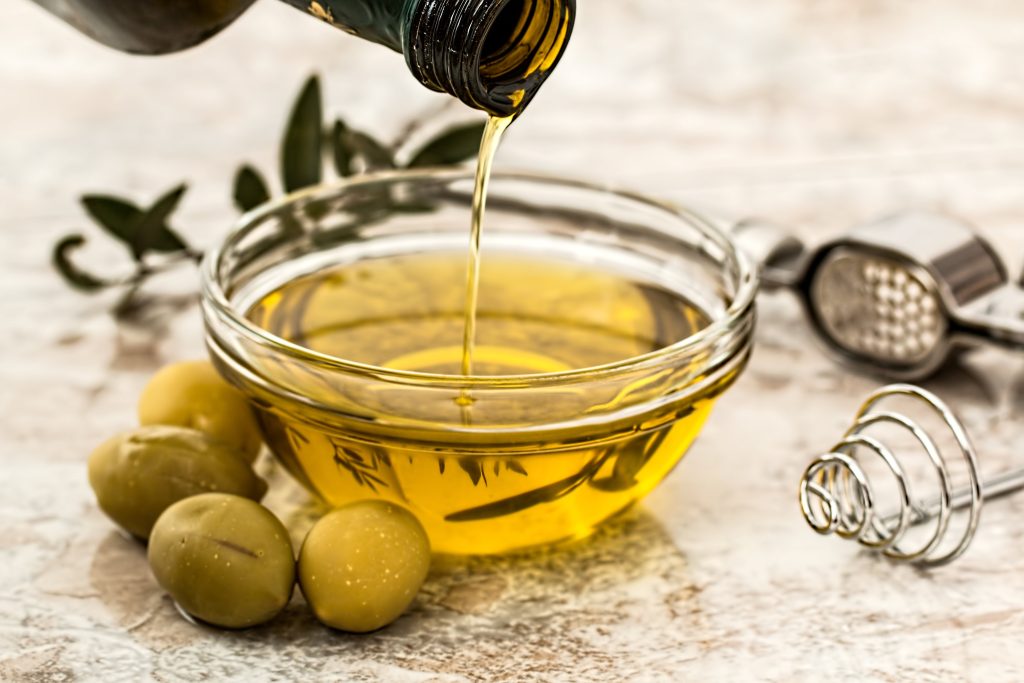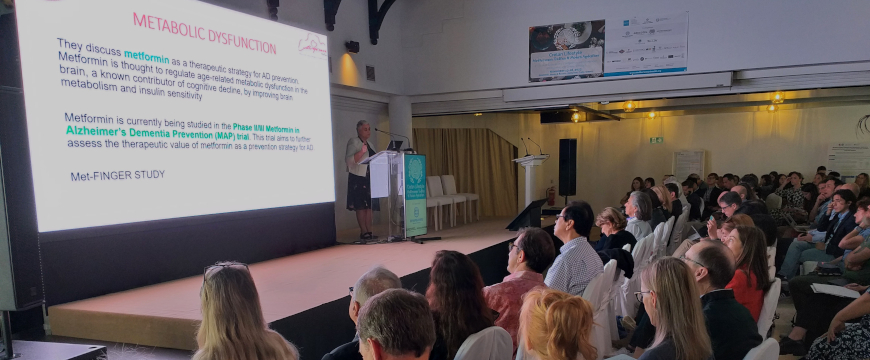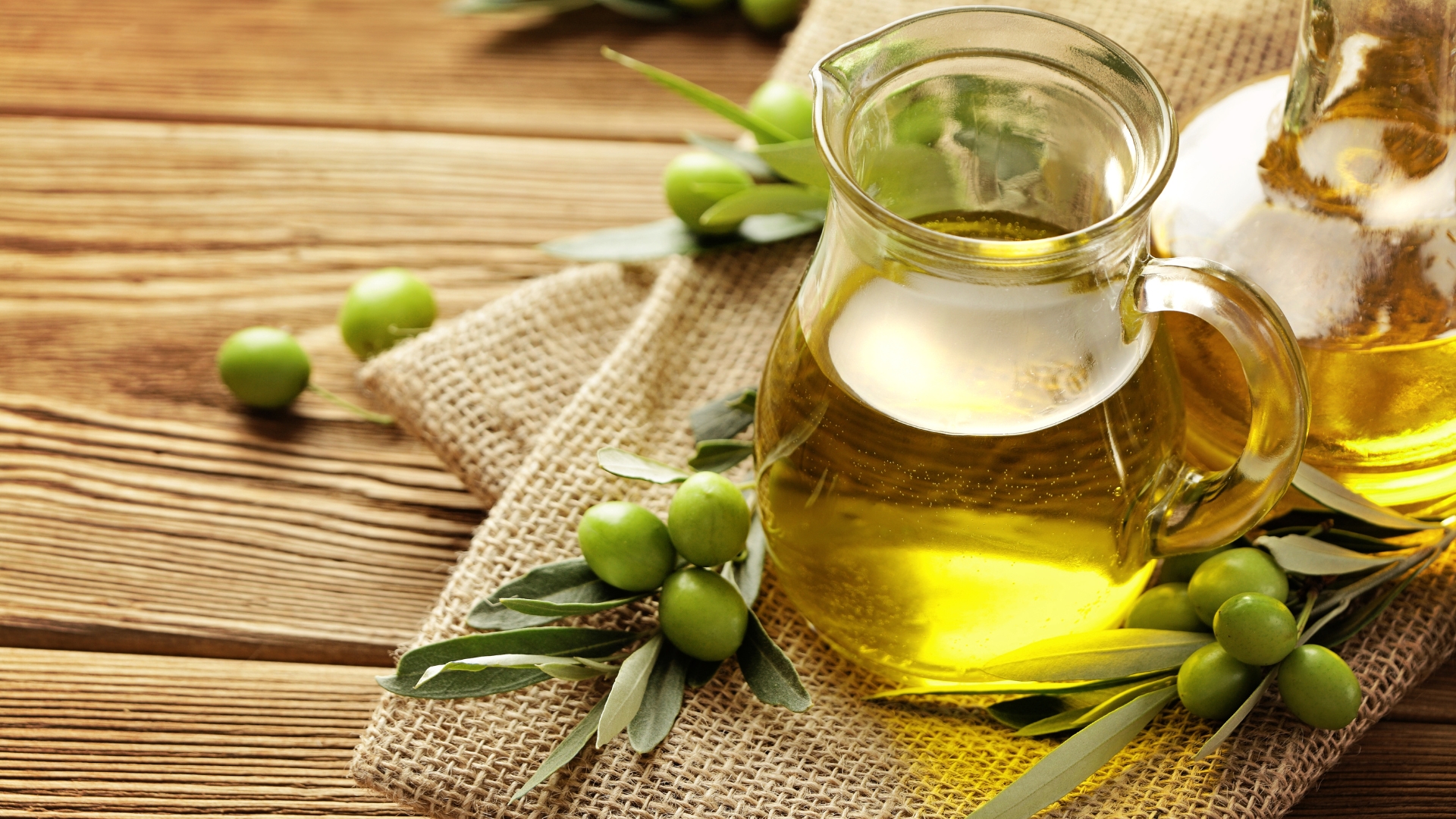By Lisa Radinovsky from Greek Liquid Gold.
At the Cretan Lifestyle Conference in Rethymno, Crete in November, Dr. Magda Tsolaki shared several types of evidence from a clinical trial to support her claim that extra virgin olive oil is “more promising than any drug being studied or any drug which already has been approved” for prevention of Alzheimer’s disease, as well as being safe and ready to use.
Unlike medications being studied in clinical trials, extra virgin olive oil (EVOO) has been available and safely used for thousands of years.
Unlike medications that have recently been approved by the US Food and Drug Administration (FDA), Tsolaki pointed out, EVOO has no serious side effects, and patients with Mild Cognitive Impairment (MCI, which precedes full-blown Alzheimer’s) had improvement. So why isn’t extra virgin olive oil being used to help prevent Alzheimer’s?
There has not been enough evidence that it can do so. However, according to greekliquidgold.com, Magda Tsolaki, MD, PhD, a neuropsychiatrist who is the Chair of the Panhellenic Alzheimer Federation, Professor Emeritus of Neurology, and Coordinator of the Laboratory of Neurodegenerative Diseases at Aristotle University of Thessaloniki, Greece, has spent ten years gathering such evidence, and EVOO’s time as an Alzheimer’s preventative may be coming.
Larger clinical trials are needed to ensure that early clinical results can be reproduced, but Tsolaki believes EVOO is now patients’ best choice for preventing—and even slowing down–a disease that still has no cure. (Patients should, however, always consult their doctors before making any changes to their treatments; this article must not be considered medical advice.)
As Tsolaki explained, there are not any medications on the market that appear to help prevent Alzheimer’s disease more than EVOO does. In small clinical studies, she has seen cognitive improvement after one year with olive oil, but Tsolaki reported that in its clinical trials Lecanemab (a drug approved by the FDA for early Alzheimer’s treatment) only succeeded in delaying the progression of the disease, not in making any improvement.
Lecanemab may also have potentially serious side effects: it has been associated with edema (fluid formation) and hemorrhage (bleeding) in the brain. There may be a greater risk of these side effects in certain patients, and the drug is not expected to help others. Tsolaki reported that this makes it inappropriate for the majority of Alzheimer’s patients who are carriers of AΡOE ε4 (about 65%) to use Lecanemab. On the other hand, she added, “with olive oil you only have a tasty food to eat. You may gain weight if you eat too much, but only 3 spoons or 50 ml/day of moderately high phenolic EVOO with a health claim is enough.”

To support her claims, Tsolaki presented a talk titled “Evidence for Olive Oil Supplementation as a Dementia Prevention Strategy” at the Cretan Lifestyle Conference. She started by discussing a recent review article that describes medications now being studied for their ability to combat seven different “mechanisms” of Alzheimer’s disease (AD), or reasons why the symptoms occur (such as inflammation and oxidative stress).
While several of the drugs she mentioned offer some hope, many studies of them have not yet shown results, “so that we will have to wait a long time for an answer about their effectiveness,” as Tsolaki explained. For this reason, and because Alzheimer drugs can have very serious side effects, EVOO may offer a better immediate solution for patients with Mild Cognitive Impairment who need help now.
In her presentation, Tsolaki pointed out that the FDA-approved drug “Lecanemab significantly slowed disease progression” from 6 months to 18 months, while reporting that the MICOIL clinical trial of EVOO showed actual improvement in three scales (not only slowing down disease progression), without any side effects after one year.
As explained in detail in eight scientific articles in the Journal of Alzheimer’s Disease, as well as Experimental Gerontology, and also GSC Advanced Research and Reviews in 2020 and 2021, the MICOIL study provided many different types of evidence (in both clinical and laboratory results) that EVOO containing moderate to high amounts of natural phenolic compounds helped patients with MCI remain at or even return to a better, more normal cognitive state, while a control group progressed toward Alzheimer’s over 12 months. The MICOIL researchers were considering the stage of MCI, but Tsolaki hypothesizes that if someone has entered dementia, EVOO is likely to slow down its progression.
As she explained in her presentation, Tsolaki’s research team believes there are many reasons that EVOO has this positive effect on the brain; the easiest for nonscientists to understand is the established link between Alzheimer’s and chronic inflammation, on the one hand, and the well-known anti-inflammatory effects of the olive oil components oleuropein and hydroxytyrosol, on the other. Extra virgin olive oil’s neuroprotective, anti-coagulent, and anti-oxidant properties also contribute to its ability to fight off Alzheimer’s. As one of Tsolaki’s articles indicates, with regular use EVOO also offers anti-atherosclerotic, anti-cancer, and anti-microbial properties.

Since larger clinical trials are necessary to provide stronger proof that EVOO can help Alzheimer’s patients, Tsolaki and her team continued their research with a new clinical trial. In the new trial, 100 patients with MCI regularly consumed high phenolic early harvest EVOO while following the Mediterranean diet, and another 100 patients simply followed the Mediterranean diet, using small amounts of olive oil purchased from the supermarket. The goal was to examine whether high phenolic extra virgin olive oil can stop all the processes that lead to Alzheimer’s, including the underlying causes (or “pathogenetic mechanisms”) that have been discovered recently, to prevent the disease. A statistical analysis of the results is now underway; a report will be submitted to the New England Journal of Medicine (JAMA) in the near future.
Tsolaki concluded her presentation by suggesting that the best treatment for Alzheimer’s may be a “cocktail” of natural products such as extra virgin olive oil and a combination of exercise, positive thinking, a comfortable environment, and a reduction in vascular risk factors (which include smoking, high blood pressure, high cholesterol, and obesity). She quoted Hippocrates, the ancient Greek “father of medicine,” who said 25 centuries ago, “preventing is better than treating” and “let food be thy medicine and medicine be thy food.”
Tsolaki believes “olive oil is a medicine, not a food”—an anti-inflammatory, anti-oxidant, neuroprotective, and anti-coagulent medicine. Of course, olive oil has not yet been approved as a medicine to treat any disease, and scientists do not recommend that anyone discontinue treatment recommended by their doctor, but extra virgin olive oil does already have official health claims according to the European Food Safety Authority and the US FDA, and there is evidence that it helps to prevent or cure numerous diseases. t
Companies and organisations interested in offering donations that could help support research on EVOO’s health benefits for Alzheimer’s patients are invited to email Tsolaki at tsolakim1@gmail.com. Additional funding will be required for larger studies. The results are expected to have far-reaching benefits for millions of people worldwide.
*Originally published on Greek Liquid Gold: Authentic Extra Virgin Olive Oil (greekliquidgold.com). See that site for recipes with olive oil, photos from Greece, agrotourism and food tourism suggestions, and olive oil news and information.
